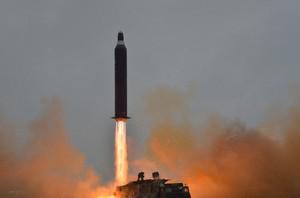North KoreaThe worry over North Korea
The risk of war on the Korean peninsula is low, says a nuclear arms expert. “Both sides are rattling sabers, but neither side is going to start a war,” says Belfer Center’s Gary Samore. “We recognize that a military attack on North Korea would probably not be effective in terms of destroying North Korea’s nuclear weapons and missile program and would run the risk of a North Korean retaliation against South Korea and Japan, which could cost hundreds of thousands of lives. And the North Koreans know that any attack on U.S. allies in the region would provoke an American response that would destroy them.”

North Korean test of long range missile // Source: theconversation.com
Despite stern warnings from both China and the United States, North Korea tried to launch another test missile this week. Amid ramped-up global tensions over that nation’s rising nuclear capabilities, President Trump has promised a tough response. Vice President Mike Pence, visiting Seoul, and Secretary of State Rex Tillerson said the administration could act more forcefully over the weapons testing. North Korean leader Kim Jong-un responded that he could embark on “all-out war” if provoked.
North Korea’s latest missile launch failed, according to U.S. military officials. The attempt took place just one day after the government, during an elaborate military parade, displayed four missile systems that showed the nation continues to push its weapons program despite economic sanctions and tough talk from the U.S. government.
Nuclear security analyst Gary Samore, A.M.’78, Ph.D. ’84, is executive director for research at the Belfer Center for Science and International Affairs at Harvard Kennedy School. He shaped U.S. nuclear policy as White House coordinator for arms control and weapons of mass destruction during the first term of the Obama administration and was the U.S. emissary during the 2010 and 2012 nuclear security summits.
Samore spoke with the Harvard Gazette’s Christina Pazzaneseabout the concern over North Korea’s nuclear test and the challenges the United States faces over the weapons program.
Gazette: What do you think happened with the missile test? Was it an accidental internal failure, a deliberate ruse to obscure North Korea’s true capacity, or outside cyber sabotage, as some speculate?
Samore: Well, there was a failure. I don’t know why it failed except there’s been quite a high rate of failure over the last year, and my guess is that’s mainly due to a very rushed pace of development. The North Korean missile program is making some progress, but I think that Kim Jong-un is willing to tolerate a very high rate of failure in his effort to try to develop a more credible long-range capability as quickly as possible. He may feel that he’s got a window of time to try to perfect some of these long-range systems, and he doesn’t seem to be deterred by all of the threats that the U.S. and China and other countries have been trying to dissuade him from continuing testing. But obviously, that’s not working.
Gazette: What do you make of Kim’s “all-out war” comment? Was that a declaration of some sort, do you think?
Samore: I think this is all just noise. Both sides are rattling sabers, but neither side is going to start a war. We recognize that a military attack on North Korea would probably not be effective in terms of destroying North Korea’s nuclear weapons and missile program and would run the risk of a North Korean retaliation against South Korea and Japan, which could cost hundreds of thousands of lives. And the North Koreans know that any attack on U.S. allies in the region would provoke an American response that would destroy them. So I think both sides are posturing, but I think the risk of war is very low.
Gazette: Does China’s warning last week about “storm clouds” brewing suggest we’ve entered into dangerous, new territory with North Korea?
Samore: I don’t think so. The Trump administration is trying to intimidate North Korea not to continue testing, and that intimidation includes both a military element … and the threat of additional sanctions. The Chinese are certainly playing along with the sanctions threat. The Chinese have communicated to North Korea publicly and privately that if they continue testing and, in particular, if they conduct a nuclear test, then China is going to join the United States in imposing additional U.N Security Council sanctions.
